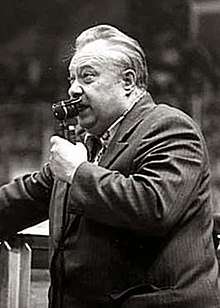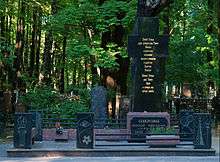Nikolai Ozerov
Nikolai Nikolayevich Ozerov (Russian: Николай Николаевич Озеров; 11 December 1922 – 2 June 1997) was a Soviet tennis player and actor, who was best known as a leading sports commentator of the Soviet Union in the 1950s–80s.[1] He was awarded the Olympic Order in 1992, and received the Paul Loicq Award in 2016.
Nikolai Ozerov | |
|---|---|
 | |
| Born | 11 December 1922 Moscow, Russia |
| Died | 2 June 1997 (aged 74) Moscow, Russia |
| Alma mater | Russian Academy of Theatre Arts |
| Occupation | tennis player, actor, sports commentator |
Biography

Ozerov was born to the opera singer Nikolai Ozerov Sr.; his mother Nadezhda trained as a stage actress, but abandoned her career to raise her two sons. His elder brother Yuri became a prominent film director, and his great-grandfather Mikhail Vinogradov was a notable 19th century composer. In the 1930s–60s Ozerov was a leading Soviet tennis player, and won 24 Soviet titles in singles and doubles between 1940 and 1963.[1] During World War II, when the German army approached Moscow, Ozerov and a few remaining in Moscow tennis players were commissioned to play a long series of exhibition matches in various parts of the city. Those matches were enthusiastically covered by radio reports to raise the people's spirit.[2]
In 1941 Ozerov enrolled to the acting department of GITIS, and after graduating in 1946 joined the Moscow Art Theater, where he played more than 20 roles. He was also featured as a sports commentator in 13 movies, such as The Hockey Players and O, Sport, You – the Peace![3][4]
His sports commentator career began on 29 August 1950, when he had his first solo report of the association football match Dynamo Moscow vs. CSKA Moscow. The report was met with a positive feedback from the radio listeners, and in the early 1950s Ozerov semi-retired from tennis to devote himself to commentator's work;[2] though he continued to win Soviet titles until 1963.[1] As a commentator Ozerov covered ice hockey at 8 Olympics and 30 world championships, and football at 8 World Cups and 6 European championships, visiting approximately 50 countries.[3] He also trained newcoming sports commentators such as Vladimir Maslachenko, Vladimir Pereturin, Yevgeni Mayorov and Anna Dmitrieva.[5][1]
Ozerov was forced to retire in 1988 as a result of competition on the Soviet television and radio. After that between 1992 and 1996 he served as chairman of the sports society Spartak,[1] for which he previously played tennis and football.[2][1] In the 1990s, he had his foot amputated after a scorpion bite, and rarely left his house after that. Leg inflammation due to the bite, combined with diabetes, eventually resulted in his death on 2 June 1997. He was buried at the Vvedenskoye Cemetery in Moscow.[3][2]
Personal life
Ozerov married aged 47, though he knew his wife since the age of 31. They had twins Nikolai and Nadezhda. Nikolai was a promising tennis player, but had to retire after a leg injury, which he received in a failed parachute jump while serving in the Soviet Army.[3] Nadezhda received the Paul Loicq Award on behalf of her deceased father in 2016.[5]
Awards and honors
- Honored Master of Sports (1947)
- Order of the Badge of Honour (1957, 1978)[5]
- Order of the Red Banner of Labour (1971)[5]
- People's Artist of Russia (1973)[3][1]
- USSR State Prize (1982)[5]
- Olympic Order (1992)[5][1]
- Order of Friendship of Peoples (1992)[5]
- Medal of the Order "For Merit to the Fatherland" (1995)[5]
- TEFI (1997)[5][1]
- Russian Tennis Hall of Fame (2003)[5]
- Paul Loicq Award (2016)[5]
References
- ОЗЕРОВ Николай Николаевич. Russian Tennis Federation
- Blignik, Igor (30 August 2013) Николай Озеров: Голос нашего спорта. worldofsport.uol.ua
- Nazarenko, Mikhail (5 June 2012) Вдова легендарного телекомментатора Николая ОЗЕРОВА Маргарита Петровна: «За отстранение Николая Николаевича от ведения репортажей проголосовал весь отдел спортивных программ — даже лучший друг предал...» bulvar.com.ua
- Nikolai Ozerov (1922–1997). IMDb
- Спортивный комментатор Николай Озеров посмертно введен в Зал славы IIHF. tass.ru (22 May 2016)